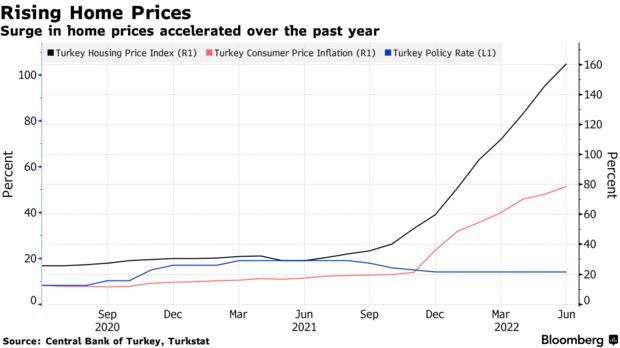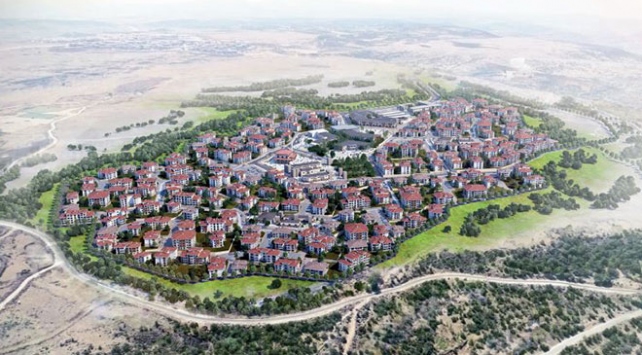Turkish President Recep Tayyip Erdogan unveiled plans to spend $50 billion building 500,000 new homes and 50,000 offices in what he billed as Turkey’s biggest ever home-ownership push, hoping to win over lower-income voters ahead of next year’s elections.
It’s the latest attempt by Turkey’s longest-serving leader to reverse a decline in support among his core backers as a jump in home prices and rents, alongside surging inflation, has left many Turks disillusioned with the ruling AK Party.

Poorer voters are increasingly blaming the government for policy mistakes that lowered their purchasing power, said Osman Sert, research director at pollster PanoramaTR. “The distance between them and the AK Party is widening,” he said.
That fallout is alarming for Erdogan, who has seen a steady decline in poll ratings as inflation climbed from lower double-digits to over 80%, fueled in part by an ultra-loose monetary policy dictated by a leader known for his thesis that higher interest rates fuel price increases.
Back-to-back increases to the minimum wage contributed to even faster price gains and failed to reverse the drop in the president’s popularity. His AK Party remains Turkey’s most popular party over a fractured opposition, but it lost control of the country’s biggest cities in municipal polls in 2019, before roaring inflation started eating into salaries.
“Over 80% of the eligible voters say the economy is in bad shape, but that doesn’t guarantee a win for the opposition,” Sert said.
New Homes
According to the plan unveiled by Erdogan on Tuesday, state-run housing agency TOKI will build 500,000 homes and sell 250,000 land plots to qualifying applicants. The government will extend repayment period to 20 years to keep monthly payments at as low as $125 in a country where the minimum monthly wage is about $300.
When implemented — over the next five years — the project could provide relief for those hit hardest by the massive rally in Turkey’s housing market. Prices and rents have more than doubled in less than a year in largest cities such as Istanbul, while salary increases have lagged far behind.
The government expects to invest as much as $50 billion to build the homes, a reasonable objective given the fiscal room policy makers have. The administration sees the year-end budget deficit at 3.4% of Turkey’s $830 billion economy after running a surplus during the first seven months of 2022.
Hilmi Dasdemir, chief of Ankara-based polling firm Optimar, said previous aid packages enabled the government to claw back some lost support. “AK Party’s votes have been in decline due to economic woes since the pandemic began, but it never fell below 35%,” he said.
Many Turks say the economy will continue to deteriorate no matter who runs the country, a pessimism that might prevent some voters switching to Erdogan’s rivals. The president has successfully portrayed himself as the guarantor of economic stability during previous election campaigns and he revisited that theme earlier this year.
“We are the ones who can solve the problems that need to be solved, especially inflation,” Erdogan said in January. “We know that huge price hikes and inflation are overwhelming our nation. We do all the work while the opposition just talks.”
Bloomberg
